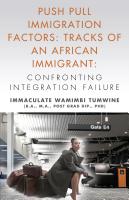| ||||||||||||
| Category: Autobiography |
(requires Adobe Reader)
|
| About the Book | |
|
PUSH PULL IMMIGRATION FACTORS: TRACKS OF AN AFRICAN IMMIGRANT - Confronting Integration Failure is a story of an accomplished African woman who leaves work on her continent. With a PhD and a Postgraduate Diploma from Sheffield Hallam University (U.K.), an MA from Lyon II University (France), and a BA from Makerere University (Uganda), plus additional certificates from several countries, she qualifies to immigrate to Canada as an ďIndependent ProfessionalĒ under the Canadian immigration Point System in which points are awarded for professional skills and language proficiency, among others. Upon arrival in Canada in April, 1996, however, the author is dismayed to see a distinct mismatch between articulated immigration policy and policy implementation. She observes that, despite the premium that the Canadian immigration system placed on Educational qualifications and experience, as a prerequisite for immigration under the Point System, once in Canada, professionals found themselves un- or under-employed, most working in factories, driving taxis, cleaning washrooms, acting as pizza delivery personnel, among others. Refusing to accept defeat, in June 1997, she starts a small business that enables her to use her wide range of skills while continuing to look for paid employment. She finally gets a full-time job, five years from the date of arrival. Written from the perspective of a training and development specialist, the book draws attention to abuse of human resources in many immigrant source countries. That abuse becomes one of the key push factor for immigration-related decisions on the part of highly educated/highly skilled individuals, leading some to, at times, act erratically, ending up in worse employment circumstances and in worse exploitation. The book is a longitudinal account of personal experience over twelve years. Through tracking the authorís decision-making process, it highlights the link between good governance and brain drain in many immigrant source countries. Referring to mid-1990s, the author raises moral and public policy questions, as countries, such as Canada, developed immigration policy that attracted highly qualified individuals but whose immigration policy implementation programs had had limited success, from the perspective of those that had not succeeded in attaining their career aspirations. Written from a black African woman professionalís perspective, the book points to the impact of the problem on the individual who fails to integrate successfully in the economic life in their new homeland, and the subsequent negative impact on the immediate communities in their country of origin. Even though it focuses on the experience of one individual who immigrated under the Canadian Point System, the account acts as a Voice for foreign educated immigrants throughout the world who have not succeeded in their new homelands. It highlights the plight of the working poor, pointing to the limited supports available to individuals who are not considered poor enough to qualify for the supports that are targeted to the very poor. The book is meant to kindle discussion on abuse and misuse of human resources and brain drain; contemporary developed country manpower acquisition strategies; challenges of implementing immigration policy for large numbers of skilled immigrants.
|
|
| About the Author | |
 |
Dr. Immaculate Wamimbi Tumwine is a Canadian, born in Uganda, where she worked as trainer and consultant. Prior to immigrating to Canada in 1996, she was Communications Officer at the Association of African Universities. She worked for nine years as Projects Coordinator at the Ontario Council of Agencies Serving Immigrants. |

